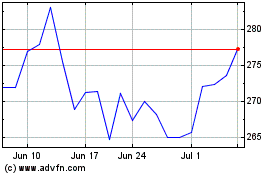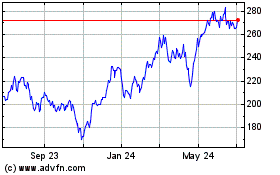Chip Deal Would Shift Qualcomm -- WSJ
October 01 2016 - 3:02AM
Dow Jones News
By Don Clark
Qualcomm Inc. is best known for designing smartphone chips --
and leaving the production to others. Now, the San Diego-based
company is in talks to acquire chip manufacturer NXP Semiconductors
NV in a strategy shift that adds to the substantial risks of a
purchase.
Capturing Netherlands-based NXP likely will cost more than $30
billion, and lead to owning seven factories in five countries that
turn silicon wafers into chips. Besides those plants, known as
fabs, NXP operates seven facilities that package and test chips
before they are sold.
NXP, which became a bigger manufacturer through the purchase
last year of Freescale Semiconductor, churns out more than half of
its vast line of products from those factories. It is the No.1
supplier of automotive chips, a fast-growing market. Analysts
believe the potential to supply its chips for self-driving cars is
a major motivation for Qualcomm to pursue deal talks first reported
by The Wall Street Journal on Thursday.
Qualcomm pioneered what the semiconductor industry calls the
"fabless" business model. The company's popular wireless chips,
used in the smartphones of Apple Inc. and others, are mostly
manufactured by Taiwan Semiconductor Manufacturing Co. and firms
that build products to order for chip designers.
Analysts and industry executives say running factories requires
a different set of management skills than designing chips. Those
include tracking the age and performance of manufacturing
equipment, overseeing a supply chain of materials and managing
production workers, who are represented by labor unions in some NXP
locations.
"It's a very, very different thinking process," said Alex Lidow,
chief executive of chip designer Efficient Power Conversion
Corp.
He opted for a fabless model when co-founding the El Segundo,
Calif., startup after 12 years as CEO of International Rectifier
Corp., which operated a global network of factories with
similarities to NXP's. "I don't want to do that again, frankly," he
said.
The fabless model allows chip designers to avoid the cost of
operating and building advanced fabs, which can cost more than $10
billion each for facilities that can create the most advanced
chips. Qualcomm will continue to need that level of production
technology from partners to keep its wireless chips competitive
with rivals -- particularly Intel Corp., which both designs and
builds its own devices.
NXP, by contrast, has older factories that couldn't be easily
adapted to make Qualcomm's chips, analysts say. The company
inherited operations that began more than 60 years ago as part of
the Dutch giant Philips NV and Motorola Inc., which spun off its
chip business to create Freescale.
Mature plants like NXP's are maintained throughout the industry
to produce some kinds of chips, particularly those that use analog
rather than digital technology for applications such as radio. Dan
Hutcheson, an analyst at VLSI Research Inc., said NXP's fabs are
highly profitable, in part because their production gear was
written off years ago.
Mr. Hutcheson said Qualcomm executives have developed a
sophisticated understanding of manufacturing issues by overseeing
work handled at partners such as TSMC. "They won't understand how
you actually run a fab, " he said. "That could potentially trip
them up, but I don't think that is a big deal."
There are other management challenges to consider that are
associated with a deal for NXP, which people familiar with the
situation don't expect to be signed for two to three months. One
comes from NXP's sheer size. The Dutch company has about 45,000
employees, according to public filings, substantially more than the
33,000 Qualcomm disclosed last year in its most recent annual
report.
Another challenge concerns sales. Qualcomm gets most of its
revenue from a handful of smartphone makers, including Apple and
Samsung Electronics Co. NXP sells chips to thousands of companies
through a large sales team that couldn't easily be combined with
Qualcomm's, analysts say. Reducing the number of salespeople has
been part of the rationale for other semiconductor deals.
A deal for NXP also would substantially diversify Qualcomm's
business beyond mobile handsets. "You have significantly spread out
your revenues and you are less susceptible to a loss of one
critical customer," said Chanan Greenberg, a vice president at
Model N Inc., which makes software that chip makers use to manage
the sales process.
NXP has a broad set of technologies that could become
particularly valuable in connection with the Internet of Things, a
phrase that refers to adding sensors, communications and computing
capability to all kinds of everyday devices. It is a major supplier
of chips called microcontrollers, for example, that manage
calculating functions in many categories of office and industrial
equipment as well as cars.
NXP also has a leading position in chips for near-field
communications, or NFC, a short-range wireless technology used for
applications such as completing payments on smartphones and
unlocking car doors.
Write to Don Clark at don.clark@wsj.com
(END) Dow Jones Newswires
October 01, 2016 02:47 ET (06:47 GMT)
Copyright (c) 2016 Dow Jones & Company, Inc.
NXP Semiconductors NV (NASDAQ:NXPI)
Historical Stock Chart
From Mar 2024 to Apr 2024

NXP Semiconductors NV (NASDAQ:NXPI)
Historical Stock Chart
From Apr 2023 to Apr 2024
